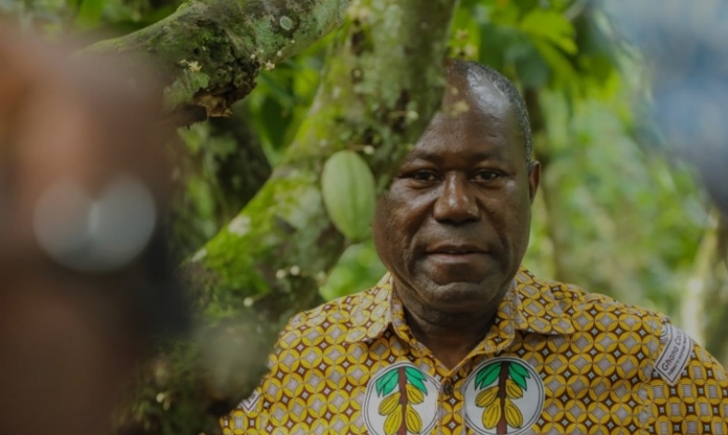
COCOBOD breaks 32-year loan cycle with decision to buy 2024/2025 season cocoa with own funds
In a historic shift from the norm, the Ghana Cocoa Board (COCOBOD) has stated that it will not be raising the annual syndicated loan to finance the purchases of cocoa beans for the 2024/25 crop season which begins on September 1.
This marks the first time in 32 years that the cocoa sector manager and regulator will be self-financing its major operation, breaking away from its reliance on the syndicated loan from mainly foreign banks to finance the purchase of cocoa beans.
At a press conference in Accra last Tuesday evening, the Chief Executive of COCOBOD, Joseph Boahen Aidoo, said: “For the first time in the history of COCOBOD, we want to wean ourselves from the offshore syndication.
“We want to self-finance this year’s cocoa purchases. Since 1992, COCOBOD has always gone offshore to borrow from a consortium of banks and 32 years is quite a good time for any human being to learn his or her lessons,” he stated.
He said COCOBOD had been contemplating weaning itself off the offshore syndication since last year and now thought it was time to take that bold step.
$150 million savings
Mr Aidoo said the decision not to access the loan this year would save the board about $150 million which it would have paid as interest on the loans in addition to expenses to be incurred to organise a road show.
Following the country’s debt restructuring activities and some global developments, interest on the cocoa syndicated loan went up last year to over eight per cent, the highest in decades.
“This year, we were planning to raise $1.5 billion, looking at interest rates last year which was over eight per cent and other costs, it means we can save about $150 million by just not going so for the first time, we will not go,” Mr Aidoo said.
It was for that reason, he explained “we have not done any road shows or gone to Parliament to seek approval. We were assessing the whole situation and we have come to the conclusion that we have to take a bold measure,” he stated.
Cedi depreciation concerns
However, the decision by COCOBOD to forgo the offshore loan is expected to have implications for Ghana's foreign exchange reserves and the stability of the country's currency, the cedi.
This is because the syndicated loan has traditionally been a major source of foreign currency inflows for Ghana, and its absence could potentially put pressure on the cedi's exchange rate.
The syndicated loan typically involves a consortium of international banks providing a large, multi-year credit facility to COCOBOD.
It allows the cocoa regulator to pay farmers for their cocoa beans at the start of each season, before exporting the produce to generate revenue.
The syndicated loan has been a crucial part of Ghana's cocoa industry for decades, providing COCOBOD with the upfront financing it needs to fulfil its role as the sole legal buyer of cocoa beans from Ghanaian farmers.
The size of the syndicated loan varies yearly, but it is usually in the range of $1.2 billion and $1.8 billion.
By foregoing the loan for the first time since the syndicated loans started in 1992, COCOBOD is breaking away from the long-standing practice.
Revised production target
Mr Aidoo also mentioned that the board had revised its production target from the initial 810,000 tonnes to 650,000 tonnes due to unfavourable weather conditions in the Brong Ahafo and Western North regions, the key cocoa growing areas.
He said there had been some unusual dryness in those parts since June and this was affecting cocoa trees.
The Ghana Meteorological Agency (GMeT) told the Daily Graphic yesterday that areas within the transition zone of the country were likely to experience long dry periods this year, which may result in severe drought.
The forest and transition zones have been forecasted to exhibit short to normal dry spells of between eight to 10 days, where most areas will likely encounter normal durations of dry days.
Weather forecast
“It’s been cloudy and dry at the same time and for some parts of these regions, there hasn’t been any rain since June, which is very serious because by June, the trees should be flowering and the cherelles popping so when there is no rain to help them develop, we are likely to lose those ones,” GMet said.
The Chief Executive said while COCOBOD was putting in place measures to mitigate the situation, the difficulty in competing with nature was a challenge.
Sustainable sector
Ahead of the new season, Mr Aidoo assured the country that the cocoa sector was sustainable in spite of the few challenges.
He said while COCOBOD acknowledged the challenges facing the sector, including climate change, pests, diseases, smuggling and illegal mining, it took a serious exception to allegations that the sector would collapse in five years.
The Chief Executive explained that COCOBOD had implemented various initiatives to address the challenge of pests and diseases, including the Cocoa Rehabilitation Programme, which was aimed to replant diseased and unproductive cocoa trees.
He said more than 40,000 hectares of cocoa farms across the country had been rehabilitated and were ready to be handed over to the farmers.
“Tens of thousands of farms are also at various stages of the rehabilitation process. These farms are expected to add more than 200,000 tonnes to the nation’s annual production output in the next few years,” Mr Aidoo said.
To adapt to climate change, he said COCOBOD had been actively promoting agroforestry practices that integrated trees and crops on the same farmland.
That approach did not only improve soil health and biodiversity, but also provided shade for cocoa trees, helping to mitigate the effects of climate change, Mr Aidoo added.
